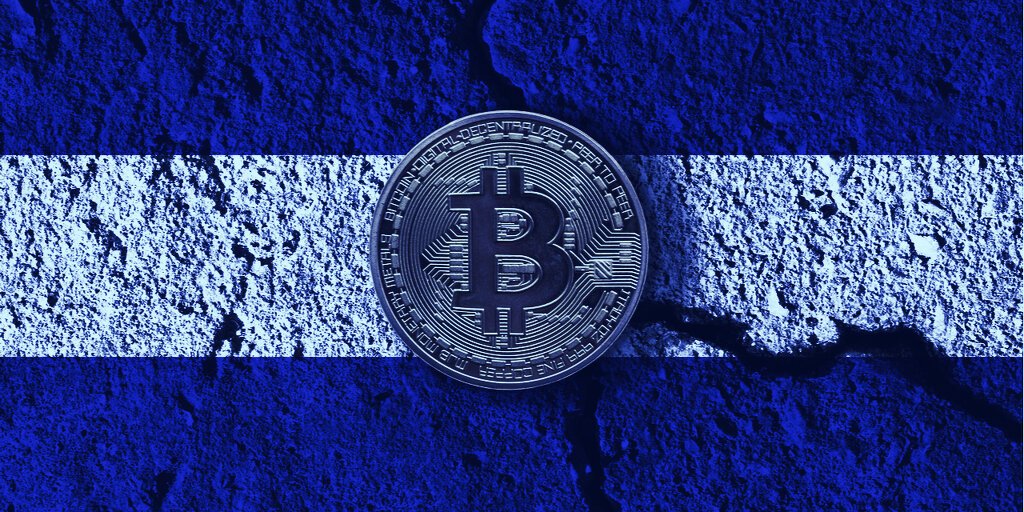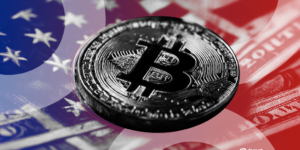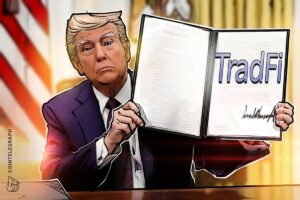
At this year’s Bitcoin Conference in Miami in June, El Salvador President Nayib Bukele announced his country would soon accept Bitcoin as legal tender.
That news was met with a roar of praise from Miami’s Bitcoin faithful, and also generated praise online from some of Bitcoin’s loudest advocates—Caitlin Long, Michael Saylor, and Peter McCormack. Others, including many of those living in El Salvador, were less enthusiastic.
After months of protests and controversy, El Salvador’s Bitcoin Law took effect on September 7.
Here, Decrypt recaps for you everything that’s happened since El Salvador’s big Bitcoin push, from protests and Bitcoin volcanoes to illegal arrests and lawsuits.
Bitcoin hits the beach
Ever since its inception over a decade ago, Bitcoin has widely been regarded as anti-state—a financial alternative for those who reject the overreach of governments and the perceived privacy transgressions of the existing financial establishment.
But in El Salvador, Bitcoin took an unprecedented turn—it became a currency of choice for the state.
“Next week, I will send to Congress a bill that will make Bitcoin legal tender,” Bukele told the roaring Miami crowd.
Despite the unprecedented step, Bukele’s move actually borrowed from Bitcoin’s playbook. His policy was designed as El Salvador’s state-wide hedge against inflation.
El Salvador, one of the few non-U.S. economies that uses the U.S. dollar, is highly reliant on remittance—payments from those working abroad (often in the U.S.) being sent back to friends and family.
Like many Bitcoiners, Bukele has lamented the fact that the dollar is prone to inflation. Making matters worse, Salvadorans do not have any political control over the currency. If Washington, D.C., pursues economic policies that cause inflation, Salvadorans can only watch on as their purchasing power declines.
Not anymore. Given Bitcoin’s perceived quality as a hedge against inflation, it became Bukele’s new Salvadoran currency of choice.
“Today, the world changes for the better. Today, humanity takes a leap forward in instilling human freedom, financial inclusivity, and so much more,” Strike’s Jack Mallers raved on the day of Bukele’s announcement.
Putting the world on notice
When Bukele first announced his Bitcoin embrace in Miami, he was speaking to an intensely passionate, Bitcoin maximalist microcosm of the wider crypto community.
The rest of the world has been less enthusiastic about the economics of Bitcoin as legal tender.
In June, the International Monetary Fund said El Salvador’s decision to adopt Bitcoin as legal tender raised several “macroeconomic, financial, and legal issues that require very careful analysis.”
In the same month, the World Bank chimed in, saying it wouldn’t help El Salvador move to establish Bitcoin as legal tender due to concerns over the cryptocurrency’s lack of transparency, and well-documented damage to the environment.
JPMorgan raised another red flag. “There are clearly important implications for that country, but it is difficult to see any tangible economic benefits associated with adopting Bitcoin as a second form of legal tender,” analysts at the bank said—also in June.
There’s also been controversy surrounding Zap Solutions Inc., whose digital wallet Strike has been used to facilitate cash-to-crypto transfers in El Salvador. An investigation by Decrypt found that Zap lacked licenses to operate in most U.S. states. Experts suggested that this meant many crypto transactions to El Salvador using Strike potentially were illegal.
Neither Strike nor CEO Jack Mallers ever replied to requests for comment from Decrypt. But since then, Zap has gained money transmitter licenses in 17 U.S. states.
Just last month, some of the concerns raised by the World Bank and IMF were also raised by the Bank of England. The BoE governor, Andrew Bailey, said that what worried him “most of all” about the country’s Bitcoin embrace was whether the “citizens of El Salvador understand the nature and volatility of the currency they have.”
But the past seven months have suggested El Salvador’s citizens do understand Bitcoin—and don’t want it forced on them as legal tender.
Domestic Bitcoin controversies
Inside El Salvador, the rollout of the Bitcoin Law and its Chivo wallet has been far from smooth.
Just this month, Salvadorans have been reporting Bitcoin balances vanishing from their Chivo wallets without explanation. Making matters worse, President Bukele has failed to respond to these reports.
But the complaint that many Salvadorans have voiced was not about the tech, it’s with the premise of Bitcoin being mandated by the state. Bukele previously had said Salvadorans would not have to use Bitcoin if they didn’t wish to, but that hasn’t been the case.
“What if someone doesn’t want to use Bitcoin? Well, nothing, do not download the [Chivo] app and continue your normal life,” he tweeted in August.
But this contradicts Article 7 of the new law, which reads: “Every economic agent must accept Bitcoin as payment when offered to him by whoever acquires a good or service.” So Bitcoin is hardly optional for local merchants.
Salvadorans protested, protested again, and protested some more against Bitcoin. Universities also produced several surveys showing that the vast majority of Salvadorans believed Bukele’s Bitcoin bet was a bad idea.
Jamie Guevara, the deputy leader of El Salvador’s opposition party, the Farabundo Marti National Liberation Front, went so far as to file a lawsuit against the government. Guevara was supported by a group of citizens who believe the law is unconstitutional and harmful.
So far these efforts haven’t had much impact: Bukele, who has a well-documented authoritarian streak, has not wavered in his Bitcoin flag-waving.
A public blockchain with no transparency
In September, El Salvador’s law enforcement arrested well-known Bitcoin critic Mario Gomez—without a warrant.
“The police kidnapped Mario. He was ‘arrested’ without a judicial order,” a local businessperson told Decrypt on condition of anonymity. Gomez’s legal counsel Otto Flores also said it was “not clear why Mario was handcuffed.”
Amid El Salvador’s heavy-handed battle with Bitcoin critics, the country’s courts quietly went about the business of expanding Bukele’s grip on power. A ruling in September allowed for Bukele to serve two consecutive terms as president, a decision slammed as unconstitutional by foreign powers including the United States.
¿Qué sigue? Si nos guiamos por la historia de Venezuela:Censura a la prensaRestricciones a la sociedad civilImpunidad total por violaciones de DDHHDetenciones de opositoresFraude electoral…¿La comunidad internacional va a esperar a ver si Bukele sigue la tendencia?
— José Miguel Vivanco (@JMVivancoHRW) September 6, 2021
Jose Miguel Vivanco, another critic of Bukele’s, pulled no punches in tweeting: “What’s next? If we are guided by the history of Venezuela: censorship of the press, restrictions on civil society, total impunity for human rights violations, arrests of opponents, electoral fraud.”
Buying Bitcoin, but when and how much?
As of today’s date, Bukele has purchased over 1,000 BTC with public money.
Searching for the phrase “buying the dip” gives some insight into the president’s Bitcoin policy. For example, Bukele bought 150 BTC, 420 BTC, 100 BTC in September, October, and November, respectively.
But that’s where the transparency ends. To date, nobody knows who controls the country’s private keys—a serious issue considering the fact El Salvador’s Bitcoin is being added to the Treasury.
“There are so many things that are not being disclosed,” Nolvia Serrano, head of operations in El Salvador for BlockBank, said in September on the Decrypt Daily podcast. “For example, who’s holding the private keys to these Bitcoin? Also, what’s the criteria for saying, ‘Oh, today, we’re going to buy more Bitcoin, or we’re going to wait until next month.’ We don’t know that.”
Serrano added, “There’s no space to make wrong calls on this, and we need to be transparent because the cryptocurrency community cares about these principles.”













